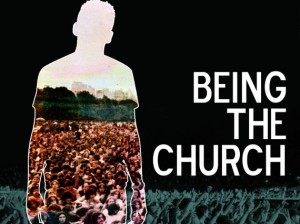What is the mystery that was hidden for generations, but is now revealed in Jesus? And what is salvation? Is salvation when we get eternal life so we can go to heaven when we die? These questions will be answered in this study of Ephesians 1:9-13. We will also address the current violence in the Middle East between Israel and Hamas, and answer a question from a reader about Jesus’ statement from the cross, “My God, My God, why have You forsaken me?”
Current Events: Israel and Palestine
Hamas, the Palestinian terrorist organization, recently started launching rockets into Israel this last week. In response, Israel started shooting the rockets down and returning fire. It has been shocking to see how many people have responded to these events. Rather than condemning Hamas for launching the rockets in the first place, many are condemning Israel for defending themselves and retaliating.

The idiocy of condemning Israel for defending itself is nicely summed up by a recent satirical Babylon Bee headline, which said: “Tensions Rise In Middle East As One Side Wants To Kill Jews And The Other Side Are Jews Who Don’t Want To Die And Neither Will Compromise” It’s satire, but like all good satire, it’s pretty close to the truth of what is actually being said by many leaders and politicians. “Why is Israel so mean in attacking the poor Palestinians?” they whine. “All the Palestinians want is to kill all the Jews.”
My stance is that Israel has a right to defend itself against the unprovoked attacks from Hamas.
But there’s the problem. Many on the left are saying that Hamas was provoked. And what did Israel do to provoke Hamas? Well … they defended themselves. I read one article this week in which the liberal journalist said that Hamas just wants the land back that Israel “stole” from them in the 1967 six-day war. But when you go back and look at what actually happened in 1967, some of the surrounding Arab nations decided to attack Israel. In preparation for this attack, they told the Arab people in Israel to temporarily leave so that they would not die in the attack.
Israel, of course, defended herself from the attack and was victorious. And to further protect herself from future attacks, they kept the land that they won in the war, which had been abandoned by the Arabs. Of course, now, most of the world condemns Israel for “illegally taking and occupying” Palestinian territory. But that is not what happened at all. Israel defended herself, and continues to do so, against Hamas, which has publicly declared that their primary goal is to obliterate and destroy Israel as a nation.
So Israel is simply defending herself against people who want to destroy her. Is that a crime? Of course not.
The other criticism we recently hear from various politicians and journalists is that Israel does not have a right to exist because it is an apartheid state, much like South Africa was. Members of “The Squad” in congress say that Israel is a racist country that dehumanizes the Arab citizens of Israel and keeps them from being elected or having power.
 But this is a bald-faced lie.
But this is a bald-faced lie.
Israel is a democracy. Is is the only democracy in the Middle East. Israel affords its Arab citizens full rights. Arab Israelis are full participants in Israeli society. They vote in elections and Arab parties sit in parliament. There are Arab justices on the Supreme Court. About 20% of doctors in Israel and about half of pharmacists are Arab. Only 20%! Such racism! Well, Arabs are a minority in Israel, representing 20% of the population, so 20% representation is exactly what you would expect.
The Palestinian territories, however, are the exact opposite. You cannot find an Arab-dominated country that affords Jews the same rights in Arab countries that Israel gives to Arab citizens in Israel. There is a complete lack of democracy among Arab nations. Jewish and Christian minorities are abused, mistreated, and given almost no voice at all in these other countries. Therefore, all Arab countries are more apartheid than Israel has ever been.
All this is to say that I stand by Israel in her right to defend herself against attacks. And I condemn the violent and unprovoked attacks by Hamas upon the Israeli people.
It should also be pointed out that none of this would be happening right now if President Trump had been re-elected. There was peace in the Middle-East during his years in office, largely due to his strong stance on foreign policy. The death and violence occurring right now in the Middle East can be laid squarely on Biden’s weak and incoherent foreign policy. I hope that all Christians can condemn the violence in Israel and call for Hamas to stop attacking Israel. We must pray and work for the peace of Israel.
Letter from a Listener
Here is a question I received from Joan Vitale:
I have a question regarding Jesus “My God My God why have you forsaken Me?”
Common beliefs are that God turned away from Jesus at the moment as He took upon the sins of the world. I am not convinced this is so. Why? Because God never leaves us never forsakes us. Why would He forsake His only Son?
Instead I feel that Jesus did not become sin for us, but rather He became the sacrifice for our sins just as the Old Testament sacrifices did not take away people’s sins but instead they were sacrificially offered (sin offering) and that is why Jesus is also known as the Lamb of God who takes away the sins of the world.
What are your beliefs on this?
Joan, I like your thinking on this. Especially the fact that since God will never leave or forsake us, why would God leave or forsake Jesus? It doesn’t make sense.
 I have answered this question previously, here is the link: Why Did Jesus say “My God, My God, Why Have You Forsaken Me?”
I have answered this question previously, here is the link: Why Did Jesus say “My God, My God, Why Have You Forsaken Me?”
But here is a brief summary of what I wrote in that article:
Jesus came to this earth to fully identify with us as humans. However, how could Jesus do this if He never sinned? We live in a constant state of sinfulness, which is a large part of the fear, pain, and frustration we experience as humans. How can Jesus identify with us if He never experienced this pain and frustration of sin?
I believe Jesus did experience it when He took our sin upon Himself on the cross. It was only when the crushing despair of being separated from God came upon Him, that He finally felt what we humans have lived with since we were born. The pain and anguish we feel every day, the suffering of being separated from God that has so numbed our souls, the despair and fear that drives us to live as we do, was felt for the very first time by Jesus on the cross when sin came upon Him.
His cry, “My God, my God, Why have You forsaken Me?” (Matthew 17:46; Psalm 22:1) is not the cry of the God-forsaken God, but is the heart cry of every single human being on earth. It is the cry we have been voicing since the beginning when we fell into sin.
This is not just the cry of Jesus on the cross. This is the cry of every single person on earth.
It is our pain, our fear, our hurt, our despair, finally being given a voice. It is the cry of God fully entering into our broken condition and fully experiencing the sense of separation from God that sin causes, and crying out in anguish and despair over this sense of loss, “My God, my God, why have You forsaken me?”
When we feel that God is ignoring us, or has abandoned us, Jesus knows what we feel, and He cries out to God on our behalf, “Why have You forsaken Me?”
When we experience fear in the night about our future, Jesus knows what we feel, and He cries out to God on our behalf, “Why have You forsaken Me?”
When bad things happen in this world, and we wonder what God is doing about them (if anything), Jesus knows what we feel, and He cries out to God on our behalf, “Why have You forsaken Me?”
When we feel despised and rejected, abused and slandered, misunderstood and forgotten, and we wonder why God seems to be doing nothing to protect and defend us, Jesus knows what we feel, and He cries out to God on our behalf, “Why have You forsaken Me?”
The separation from God that Jesus experienced on the cross is the separation from God that humans experience every day. Certainly, since He is God and since He bore every sin of every person, He experienced this separation to an infinite degree. But still, the cry of Jesus from the cross, “My God, my God, why have You forsaken Me?” is not just the cry of Jesus, but is our cry.
It is the cry of every single human being on earth. Jesus was giving voice to our pain and anguish.
Do you feel abandoned by God? Jesus knows what that feels like. Do you feel forsaken, neglected, forgotten, and overlooked? Jesus knows what that feels like. Do you feel like God has turned His back? Jesus knows what that feels like.

But here is the thing…
The original question was “How can Jesus say ‘Why have you forsaken me?’ when God did not actually forsake Him?”
Just as Jesus felt what we all feel to be forsaken, so also, none of us have been forsaken, just as Jesus Himself was not.
Though you may feel abandoned by God, you are no more abandoned than was Jesus. Though you may feel forsaken, forgotten, neglected, and overlooked, these things are no more true of you than they were of Jesus. Though you may feel unloved, this is no more true of you than it was for Jesus.
Though Jesus cried out, “Why have you forsaken me?” He was NOT forsaken. And neither are we.
This is a feeling that Jesus experienced, which is a feeling we ALL experience.
And this feeling does not come because we are forsaken, but because of sin. Sin has separated us from God; it has not separated God from us. This is why God had to reconcile the world to Himself (1 Cor 5:19). He didn’t need to reconcile Himself to the world, for He never left or abandoned us.
Though we may feel forsaken, we are not forsaken any more than Jesus was forsaken.
God did not forsake Jesus, and God does not forsake us. The presence of sin in our lives makes us feel like we are forsaken, like God has abandoned us, forgotten us, or left us alone to suffer and die, when in fact, God is right there all the time, holding us, loving us, and crying with us over our pain.
It is sin that makes us feel separated from God, and this is the feeling Jesus expressed on the cross, and is one reason Jesus went to the cross – to take our sin and bear it away into death so that we can see that God has not left us, has not abandoned us, and has not forsaken us, but has fully entered into our pain, our suffering, and even into our sin, so that He might show us how much He loves and cares for us. This truth is explained in more detail in my book, The Atonement of God.
Hope that helps a bit!
Salvation in the Son (Ephesians 1:9-13)
This study is drawn from my sermon on Ephesians 1:7-13.
Ephesians 1:9-10. And he made known to us the mystery of His will according to His good pleasure, which He purposed in Christ, to be put into effect when the times will have reached their fulfillment—to bring all things in heaven and on earth together under one head, even Christ.
 In Ephesians 1:9, Paul says that for many years, God had a secret, a mystery, which He has just now made known to the world.
In Ephesians 1:9, Paul says that for many years, God had a secret, a mystery, which He has just now made known to the world.
The fact that it is a mystery does not mean it was hard to understand, but simply that it was something previously unknown. There were clues and hints about this mystery throughout the Old Testament, but now God has made it plain as day and wants the whole world to know.
Paul says this was a mystery of God’s will, according to his good pleasure and that it primarily involved Christ, and that the accomplishment of this mystery of God’s will would not be completed until the end of time.
And what is that mystery? It is that God was going to unite all the people of the world into one family in Jesus Christ.
Ephesians 1:9-10 says that God’s goal was to to bring all things in heaven and on earth together under one head, even Christ. This is a reference to the church as the body of Christ. The Church is the key to world peace.
We previously discussed the ongoing violence in the Middle East between the Jews and the Arabs. According to Paul, the key to peace between warring people groups is not more violence, but to see that we are not two different people groups, but are rather one people under Jesus Christ. We are not enemies, but brothers, with one another.
This truth will be unpacked in great detail in Ephesians 2. Ephesians 2 is all about how to bring peace to warring groups of people.
Now when Paul says that everything is brought together into one head, Jesus Christ, Paul is not teaching that everyone will become a Christian here—or that Satan and his demons will be united to Christ. No, this is unbiblical. This verse is saying that Christ will rule over all—will have dominion over all. The kingdom of God has come upon the earth in Jesus Christ, and everyone and everything is under the rule of this kingdom, but the power and plans are still not accepted or followed everywhere, which is why the church is supposed to go forward in the name of Jesus to show the world how to live at peace with each other.
Again, this is foreshadowing of Ephesians 2, where Paul will show how Jesus did all this, and how we can call the world to peace as well.
Ephesians 1:11-12 summarize the blessings of God in Christ that we have so far been given, so I’m not going to spend much time on these verses because they are simply reiterating and repeating what Paul has already said.
Ephesians 1:11. In him we were also [made heirs], having been predestined according to the plan of him who works out everything in conformity with the purpose of his will,
Again, Paul is just reiterating the fact that our predestination was not to eternal life, but to the adoption as sons, the redemption of our bodies, the giving of an inheritance to His children. The inheritance, the riches, the blessings, is what Paul is describing in these first three chapters of Ephesians.
Ephesians 1:12. … in order that we, who were the first to hope in Christ, might be for the praise of his glory.
The first to hope in Christ were simply Paul and the first believers in Ephesus. But this still applies to us as well. It says that all of this that is done is for God’s glory. It is not for our glory, or our praise, but for the praise of God’s glory alone. The truth of these verses then is that as Christians, we have incredible riches in Christ. We are spiritual multi-billionaires.
Finally, the first part of Ephesians 1:13 summarizes all of the riches we have in Jesus Christ by including them as elements within the word of truth, the gospel of your salvation.

Ephesians 1:13a. And you also were included in Christ when you heard the word of truth, the gospel of your salvation.
The word of truth and the gospel of your salvation are different terms for the same message. This message is simply the good news of salvation.
Understanding the word salvation is going to be very important as we continue to work our way through Ephesians, especially when we get to Ephesians 2:8-9. So let us pause briefly here in Ephesians 1:13 to point out once again that the word salvation does not refer to going to heaven when you die. Instead, the word means “deliverance” and the context reveals what we are delivered from. I will explain this word in great detail in my Gospel Dictionary online course.
In Ephesians 1:13, the word salvation does not refer to escaping hell and going to heaven when we die. It does not refer to receiving eternal life. Instead, it refers to being liberated from the devastating and destructive consequences of sin in our lives so that we can live now, in this life, the way God wants us to live. How? By recognizing the vast storehouse of riches that we have in Jesus Christ, and then learning to live in light of those now. By starting to draw on our inheritance now.
This is what the word salvation means in Ephesians. It is not talking about where we go when we die, but rather, how our life is to be lived now in light of the riches we have in Jesus Christ. This is also how Paul refers to salvation in Ephesians 2, which, again, we will discuss further when we get there.
The concept of salvation in Paul’s writings is very close to the concept of the Kingdom of God in the teaching of Jesus. Just as the Kingdom of God does not refer to going to heaven when we die, and just as the Kingdom of God refers to God’s rule and reign in our lives right now, so also, salvation does not refer to going to heaven when we die, but refers to the redemption and release from our captivity to sin so that we can live lives of freedom, grace, glory, and joy within God’s family here in this life and for all eternity.
So we have seen two great riches in Ephesians 1. The great riches we have in Jesus include the resources to break free from patterns of sin and to live in our lives as God wants, calls, and desires us to live. In this way, we can rule and reign with Jesus in the Kingdom of God on this earth and for all eternity. As we live this way, we show the world how to live in peace with God and with one another.
But if this seems like a difficult task, there is another great blessing God has given to us, which gives us the power to live as God wants and desires. We will look at this next great blessing next time when we consider the rest of Ephesians 1:13.


 Millions of Christians have questions about church and how to find true Christian fellowship. In this podcast interview, Richard Jacobson and Jeremy Myers discuss how to be the church and why Hebrews 10:25 does not teach that all Christians must attend a church service on Sunday morning.
Millions of Christians have questions about church and how to find true Christian fellowship. In this podcast interview, Richard Jacobson and Jeremy Myers discuss how to be the church and why Hebrews 10:25 does not teach that all Christians must attend a church service on Sunday morning.
 When most Christians read this, they imagine the church as this impregnable fortress, with huge white granite walls, behind which all the people of God huddle together in safety as the forces of evil attack from outside.
When most Christians read this, they imagine the church as this impregnable fortress, with huge white granite walls, behind which all the people of God huddle together in safety as the forces of evil attack from outside. It is not the church that is attempting to hide behind gleaming walls as against an invading army. No, it is Satan and his minions who are huddled behind their blackened walls, hoping that the gates will hold.
It is not the church that is attempting to hide behind gleaming walls as against an invading army. No, it is Satan and his minions who are huddled behind their blackened walls, hoping that the gates will hold. The terrible, tragic reality is that while the church gets so caught up in the debate about who goes to hell, and how long they will be there, and whether or not hell is a place of eternal suffering or temporary purification, we are ignoring the people living in hell on earth all around us.
The terrible, tragic reality is that while the church gets so caught up in the debate about who goes to hell, and how long they will be there, and whether or not hell is a place of eternal suffering or temporary purification, we are ignoring the people living in hell on earth all around us.

 Several years ago, I was interviewed by Jason Wiedel for his podcast.
Several years ago, I was interviewed by Jason Wiedel for his podcast.
 Bruxy Cavey is the senior pastor at The Meeting House, a church for people who aren’t into church. The Meeting House is a multisite Anabaptist congregation in Ontario, Canada where thousands of people connect to God and each other through Sunday services, online interaction, and a widespread house church network. His newest book,
Bruxy Cavey is the senior pastor at The Meeting House, a church for people who aren’t into church. The Meeting House is a multisite Anabaptist congregation in Ontario, Canada where thousands of people connect to God and each other through Sunday services, online interaction, and a widespread house church network. His newest book, 
